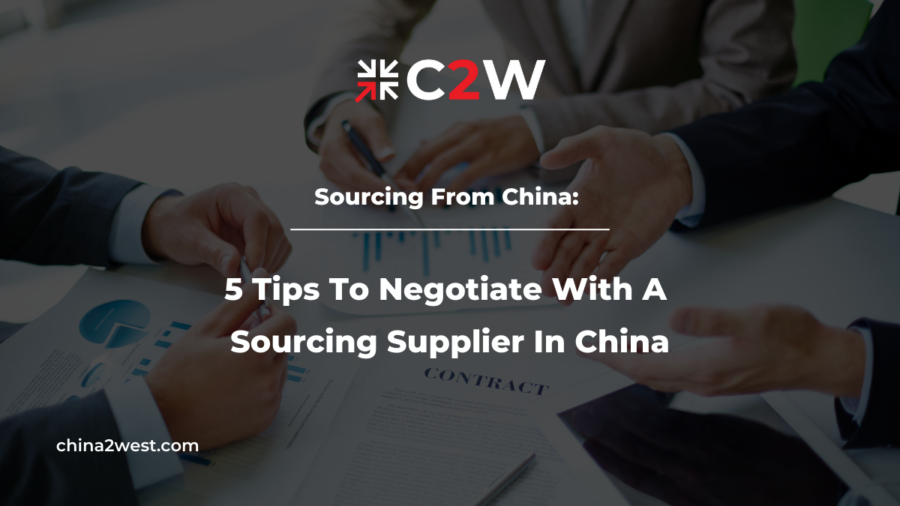You have found a great product you are going to sell to expand your business. And you may have gone through the initial steps like:
- Contacting multiple manufacturers and requesting samples
- Conducting rigorous sample testing
- Finalizing one or two sourcing suppliers based on the initial samples and price
So now all you want is to reduce costs while maintaining product quality when sourcing from China.
At this point, you are going to enter the negotiation stage as you may not intend to take the quoted prices at face value.
In this blog post, we are going to share five simple tips to help you negotiate with your Chinese sourcing supplier without compromising on quality or workmanship. Let’s get started!
Common Negotiation Points
Typically, people are quite anxious about negotiating because they fear that they’ll mess up the entire process by blurting out a demand that is too modest or too ambitious.
Before talking to your supplier, there are some common negotiation points you have to consider:
1. Minimum Order Quantities
Don’t be afraid to negotiate smaller Minimum Order Quantities (MOQs). Some suppliers will agree with a minimum order quantity that is smaller than normal if you’re willing to pay extra or they have surplus inventory.
2. Price
Price is always negotiable, which makes sense considering ordering a large number of goods will save money and there are many aspects where they can work with you such as quality inspections and international shipping.
3. Payment Terms
You should be careful about this point because it’s a two-sided sword. If you pay upfront, you can ask for a big discount; however, the effects on your cash flow could be detrimental if you don’t manage your finances well.
3. Quality
Quality is an important factor you don’t want to comprise. Keep in mind that you can ask for small improvements or quality guarantees for your product if your supplier doesn’t want to reduce the price.
4. Delivery Times
This can typically be negotiated, especially if you are willing to pay a little extra to shorten the delivery time so you receive your product as soon as possible.
What points you want to negotiate will vary depending on your needs. Remain polite but firm when it comes to bargaining with your sourcing partner as they will be likely more flexible than you expect!
Also, be prepared to walk away from the table if your supplier does not respond or does not want to change anything about this deal. It is better to leave a contract early on in the negotiating process before it has been signed and delivered!
5 Tips For Successful Negotiations
1. Make a Good First Impression
Every culture has its own set of rules or etiquette that we’re expected to abide by. One of the main etiquettes you have to keep in mind is first impressions.
Well, first impressions are just as important in China when it comes to the business world as they are anywhere else. They help to build the tone for an entire partnership between you and your supplier.
More importantly, in China, a good impression will pave the way for your business success and lead to a good relationship, aka “guanxi”.
Guanxi is all about building trust and showing mutual respect. So if you come across as arrogant or disrespectful, it will be difficult to negotiate a good deal.
To make sure you maintain guanxi with your suppliers, be humble and show them you’re interested in learning about their company and services.
you can do things the right way- whether it’s through direct interaction with them through social media sites like LinkedIn or Facebook or even at networking events.
2. Set Modest Negotiation Goals
Before negotiating with your supplier, it’s important to define your goals clearly so that you know where the boundaries are.
You should try to establish deal-breaker factors rather than hold out hope for the cheapest price possible in any given negotiation scenario.
Here is a simple example:
If your goal is to get the supplier to lower their prices by 10% while maintaining high quality, then you may want to offer them access or partnerships in other areas of the business. You can ask if they can offer a one-stop shop proposal to meet your needs which would give them extra revenue streams. This can lead to a reduction in total costs since more services will be used.
It’s worth remembering that there is often more than one way to reach the desired outcome during negotiations and different strategies will work better depending on who you’re negotiating with and what they need from you for things to go well.
3. Keep Things in Perspective
Sourcing negotiations with a Chinese supplier can be tricky, but there are many things you can do to make the process easier.
Remember what common negotiation points are? And there’s more than just the product price to work out, right?
You also need to discuss the quality of goods, delivery time, payment options, and more details to fulfill your project successfully.
All these considerations matter, so don’t let yourself get bogged down on any one point alone.
It’s also important to mention that if you are considering a long-term partnership. And you might want to talk about what kind of expectation there will be for negotiations before starting work together, though this doesn’t guarantee success.
Of course, not everything goes your way sometimes. When this happens, it’s best to evaluate both sides and come back to the table again if necessary. After all, a compromise can typically be found amongst overlapping needs from either side.
4. Be Honest
Honesty can go a long way toward reaching an agreement. It eliminates confusion when you know what to expect before negotiations begin.
Be specific about what you want, what you expect, and what you are willing to compromise on so both parties know where they stand at all times.
Honesty helps build trust and ensure that both parties are on the same page from the start.
It also helps prevent any major misunderstandings or missed expectations down the line. When it comes to negotiation, honesty is the best policy!
However, while it’s okay to let vendors know you’re entertaining offers from other parties, it’s best practice not to disclose which ones because again, costs shouldn’t be the only reason you choose a sourcing supplier.
These negotiations might not always feel comfortable, but they’ll make you more confident in your purchase decisions. And let’s face it: savvy shoppers deserve savvy business partners who’ll treat them right.
5. Don’t Get Hung Up On Who’s Right And Who’s Wrong
In any negotiation, both parties are trying to get the best possible outcome for themselves. It’s important to remember that there’s no right or wrong in a negotiation, only what’s best for you and your company.
Therefore, it’s also important to keep in mind that the other party may be willing to give you a concession on one issue if they get something in return during the negotiation.
Successful negotiators know how to find these tradeoffs and capitalize on them so that both sides feel like they got something out of the deal.
This is key, and it’s what separates the good negotiators from the masters.
To become an even better negotiator, try practicing!
Remember every time you negotiate, look for opportunities where concessions can be granted without sacrificing anything else significant.
Don’t simply talk about what you need to happen, discuss the consequences – how your solution will be beneficial to the other party.
Sourcing From China: China 2 West Can Help You
Many people make the mistake of thinking that sourcing negotiation is always a win-lose proposition. This couldn’t be further from the truth! Successful negotiation is a win-win for both parties involved. The key is to find common ground and work together to find a solution that benefits both sides.
But finding an appropriate level of balance is difficult, especially if you’re new to sourcing from China or still learning how to negotiate in general!
But don’t let that stop you – once again, China 2 West has your back.
China 2 West is a British-owned and managed company established in 2005 in Zhuhai City, Guangdong Province, South China Greater Bay Area. With over 15,000 successful projects under our belt, there’s no doubt why we can meet your needs and deliver your products successfully. Contact us today.




